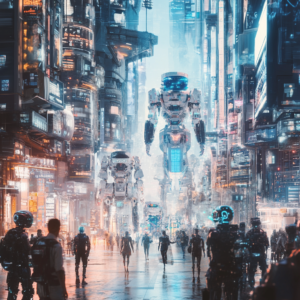
“Workday’s CEO Discusses Layoffs and AI Vision: Balancing Workforce Reskilling with Digital Integration”
In the realm of corporate maneuvers and technological wizardry, the recent decisions made by Workday, the newly minted titan of enterprise cloud applications, have emerged as both a curious spectacle and a breeding ground for debate. Picture this: Workday, a behemoth in finance and HR software, has just taken a deep breath and let go of about 1,750 employees—yes, that’s roughly 8.5% of its workforce—while simultaneously unveiling a grand vision of integrating Artificial Intelligence (AI) into its operation as if announcing a new theme park opening. What’s cooking in the cauldron of Workday’s corporate strategy? Let’s take a closer look at what CEO Carl Eschenbach is stirring up.
The Layoffs: A Strategic Choice or a Cost-Cutting Measure?
On February 5, 2025—a date that likely landed heavily on a few career paths—Workday’s bold slice through its workforce sent shockwaves through the tech arena. Was this a ruthless cost-cutting maneuver, or was it more of a strategic alignment with the future of work? According to Eschenbach, we’re to interpret these layoffs as a calculated shift rather than mere frugality. This is about redirecting resources toward innovation, particularly in AI, as they seek to fatten those profit margins that speak their language of reinvestment.
While the act of trimming the fat seems pragmatic, it’s also a difficult pill for many to swallow—especially for those who have just been kicked to the curb. Stripping down the workforce while trumpeting a vision of tech advancement is a careful dance on the knife-edge of public perception. With a splash of ambition, Eschenbach promises that the savings harvested through these layoffs will nourish new technological endeavors, specifically the Workday Agent System of Record. This isn’t just about shifting numbers on a spreadsheet; it’s about crafting a dual workforce composed of both humans and AI agents who can presumably breeze through tasks like financial audits and contract management without breaking a sweat.
Reskilling: From Redundancy to Renaissance
Let’s hit the brakes for a moment—reskilling is the name of the game here, and Workday isn’t taking it lightly. Rather than contending that AI will steal jobs faster than you can say “furlough,” the company is pushing the narrative that augmenting human capabilities is the real prize. Eschenbach is advocate-in-chief for developing what he calls "human skills." Fancy terms like collaboration, innovative problem-solving, and thoughtful frameworks filter in as skills deemed essential for the future. Gigs within Workday’s realm are getting a facelift, urging employees to hop from role to role and stoking the embers of mobility and opportunity.
Is this merely a PR move tucked under the guise of benevolence? Maybe. Or perhaps it’s a genuine attempt to prepare the current workforce for a landscape that is increasingly dominated by digital counterparts. For every maelstrom brought about by the layoffs, the silver lining may just be the nurturing of skills that could lead to more stimulating work. So, while some are dusting off their résumés, others are packing their bags for an adventurous journey of learning and adapting.
The Digital Co-Workers: AI Agents as the New Office Companions
Now, onto the fun part. Picture it: a work environment buzzing with both humans and AI agents acting as digital coworkers. Workday is rolling out the red carpet for AI agents—dubbed "digital employees"—who, according to Eschenbach, will not just assist but operate autonomously, munching through tasks that are currently reserved for humans. This shiny new tech promises to streamline operations, enhance productivity, and, perhaps most importantly, keep things spicy on the corporate front.
How does this all unfold? With the Workday Agent System of Record standing tall as its backbone, organizations will be able to manage, provision, and train these AI agents. Think of it as human resource management, but with a digital twist. These agents will soak up knowledge and skills like a sponge, learning over time and potentially absorbing entire roles along the way. But before we all start screaming “Robot Apocalypse,” Eschenbach reassures us that there’s a world of engaging work waiting for humans on the horizon—tasks that are less about tedium and more about creativity and insight.
The Operational Symphony: Managing AI Agents Securely
When it comes to managing these nifty AI agents, Workday has constructed a robust platform to hold everything together. It’s clever, isn’t it? Organizations will have the tools to register, manage, and integrate these agents securely—think of it as a digital HR department working overtime. Features include the ability to define agent skills, set up security groups, and facilitate seamless collaboration with the Workday Assistant.
By treating AI agents with the same care as their human counterparts, Workday is not just trying to protect their digital assets; they are securing their ethical framework in the process. There’s a refreshing notion here that AI can coexist with human intelligence, crafted in a manner that respects both parties. It might just usher in a new age of workplace equality—of sorts.
The Buzz: Public and Market Reactions
Ah, but hold your applause! While the market seems to be cheering Workday's ambitious leap into the future with pockets of confidence reflecting in its stock prices, the public is striking a different tune. Social media? It’s swelling with skepticism. Critics are quick to raise eyebrows about the downsizing amidst profitable proclamations. Did they really need to ditch so many employees when the coffers are still brimming?
The juxtaposition presents a kaleidoscope of opinions, and it’s hard to navigate through the clamor. It beckons questions: Is this true corporate responsibility, or is it just a fancy mask for profit-driven motives? As the dialogues twist and turn, Workday's reputation hinges on how they continue to pivot in the coming months.
Looking Ahead: What Lies in Store for Workday and Its Workforce?
As we peer into the future illuminated by the glow of integrated technology, Workday’s strategy lays out tantalizing possibilities. If executed successfully, the AI agents might transform productivity paradigms and operational efficiency to dizzying heights. However, one cannot ignore the elephant in the room—the looming socio-economic implications. Could this push even further into the chasm of income inequality? Only time will tell if the reskilling endeavors bear fruit, resulting in renewed employee loyalty or wandering perceptions of the company’s ethos.
Conclusion: Navigating Uncharted Waters
What Workday is undertaking exemplifies a bold dance on the tightrope between innovation and human capital management. In a world increasingly driven by technology, their efforts to marry AI with human resources could very well set the stage for a new era in workforce dynamics. As they traverse the complex landscape of layoffs, reskilling, and digital employees, one can only wonder how far this journey will take them—and all of us.
So here’s the kicker, folks: want to stay in the loop with the latest buzz surrounding AI and its role in reshaping the workforce? Don’t just stand there; join the conversation! Subscribe to our Telegram channel: @ethicadvizor. Your front-row seat awaits as we unravel the future of work together!

